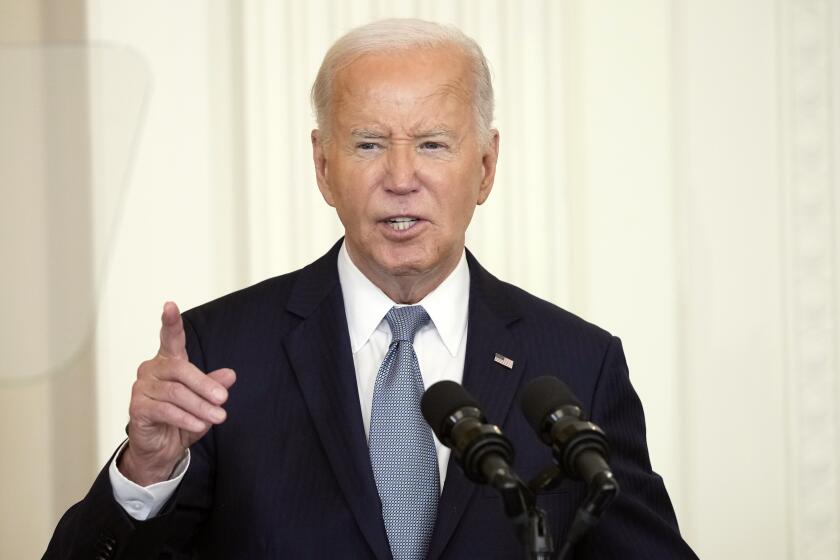FBI Clears Top Physicists of Passing A-Bomb Secrets : Weapons: Allegations in ex-KGB officer’s book that Oppenheimer, Bohr, Fermi and Szilard had given postwar aid to Soviets provoked outrage.
Closing the book on one of the most intriguing mysteries surrounding the Soviet Union’s postwar efforts to steal America’s atomic bomb secrets, the FBI on Monday officially cleared four giants of Western science of any complicity in Russian espionage.
After an internal review of still classified materials, the FBI dismissed accusations made by a former senior KGB official in a recent book charging that scientists Robert Oppenheimer, Niels Bohr, Enrico Fermi and Leo Szilard were “witting sources of the Soviet KGB” after World War II.
Those scientists played critical roles in the development of nuclear physics and the atomic bomb before and during World War II--Oppenheimer was head of the Manhattan Project, the crash wartime program that transformed the United States into the world’s first nuclear power, while Bohr, Fermi and Szilard are all credited with some of the most important discoveries in nuclear physics of the first half of the 20th Century.
But a 1994 book by former KGB officer Pavel Sudoplatov raised new accusations that the four provided information that helped the Soviet Union develop an atomic bomb of its own.
“The most vital information for developing the first Soviet atomic bomb came from scientists designing the American atomic bomb at Los Alamos, N.M.--Robert Oppenheimer, Enrico Fermi and Leo Szilard,” Sudoplatov wrote in his book, “Special Tasks.” Danish physicist Bohr, who escaped from Nazi-held Denmark in September, 1943, and joined his colleagues at Los Alamos, “helped strengthen their own inclinations to share nuclear secrets with the world academic community,” Sudoplatov alleged.
Sudoplatov’s charges outraged leading American scientists, many of whom said that the book, co-authored by an American couple, was filled with baseless and irresponsible attacks on some of the greatest scientists of the 20th Century--all of whom were conveniently dead.
In response, former Defense Secretary Les Aspin, now chairman of the President’s Foreign Intelligence Advisory Board, asked the FBI in March to review its old counterespionage files--and to tap other sources of information made available by the collapse of the Soviet Union--to clear the air.
In a letter to Aspin on Monday, FBI Director Louis J. Freeh wrote that “the FBI is not in possession of any credible evidence that would suggest that Niels Bohr, Enrico Fermi, Robert Oppenheimer, or Leo Szilard engaged in any espionage activity on behalf of any foreign power to include that involving atomic bomb secrets.
“Indeed, the FBI has classified information available that argues against the conclusions reached by the author of ‘Special Tasks.’ The FBI, therefore, considers such allegations to be unfounded.”
Supporters of the four scientists, including surviving veterans of the Manhattan Project, were elated by Monday’s announcement dismissing the accusations. “I think it is wonderful, and I am very grateful that the FBI has done this,” said Hans Bethe, who was head of the theoretical physics division at Los Alamos during the Manhattan Project and is now an emeritus professor at Cornell University. “I was convinced that these were unfounded charges anyway, but I’m glad that this statement has been made.”
Aspin said that the FBI’s classified evidence debunking Sudoplatov’s accusations includes lists of people who helped the Soviets obtain atomic secrets. The names of the four scientists did not appear on any of them.
“This is like a Sherlock Holmes case. It is a case of the dog that didn’t bark. Their names are not on these lists,” said Aspin. “It is nearly impossible to prove a negative, but there is no evidence to support the charges. And in fact, the FBI is now very comfortable in its belief that Sudoplatov is mistaken.” Aspin added that Sudoplatov may have confused code names and identities from Soviet files or his own memory.
The fact that the lists of atomic spies and accomplices of Soviet intelligence reviewed by the FBI and Aspin remain classified suggests that they may have been obtained recently as a result of the Soviet Union’s collapse. “The lists have come into U.S. hands. . . . I can’t say how,” said Aspin.
The debate over exactly how the Soviets obtained the secrets of the American atomic bomb project is one of the most enduring arguments of the postwar era. The search for A-bomb moles helped spawn the red-baiting of the Joseph McCarthy era in the 1950s. And the collapse of the Soviet Union and the opening of many of its files at the end of the Cold War have prompted a new round of historical reviews of U.S.-Soviet relations.
But virtually all Western scholars have denounced “Special Tasks” by Sudoplatov and his U.S. co-authors, Jerrold and Leona Schecter.
Jerrold Schecter, who attended Aspin’s press conference, defended the book and urged Aspin to push for complete release of classified materials to resolve the dispute.
More to Read
Start your day right
Sign up for Essential California for news, features and recommendations from the L.A. Times and beyond in your inbox six days a week.
You may occasionally receive promotional content from the Los Angeles Times.






